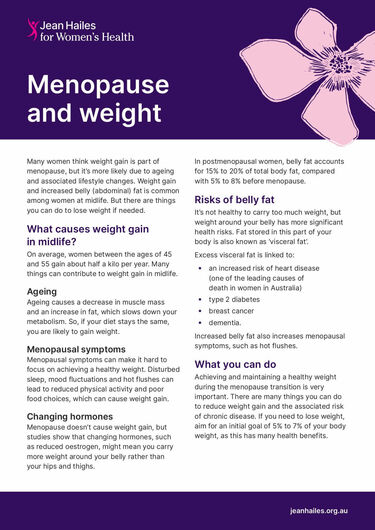“Many women think weight gain is part of menopause,
but it’s more likely due to ageing
and associated lifestyle changes”.1
Umbrella
What may the Menopause Weight Gain Umbrella include?
Depending on the Source (DotS) this Umbrella may include:
- Belly Fat
- Menopause Weight Gain
- “Menopot”
- “Middle Age Spread”
Menopause
Does menopause cause weight gain?
In Looking After Yourself: Healthy Weight the (Australian) Jean Hailes for Women’s Health (JH) explain:
Aging and Lifestyle
Does aging cause weight gain?
In Attention To Nutrition, Exercise Can Combat Weight Gain, Other Symptoms In Menopause published 16 January 2024, the authors note:
Weight Gain
How much weight do women gain on average between the ages of 40 and 60 years?
In Looking After Yourself: Healthy Weight the JH continue:
Ageing causes a decrease in muscle mass, which slows down your metabolism. So, if your diet stays the same, you are likely to gain weight”.4
In Maintaining A Healthy Diet and Weight the European Menopause and Andropause Society note:
“Women gain on average 10 kg between the ages of 40 and 60 years, independently of menopause”.5
Weight Redistribution
What is the association between menopause and weight redistribution?
In Is Menopause Making Me Put on Weight? No, But It’s Complicated: So Does Menopause Cause Weight Gain?, published 12 March 2023, the author elaborates on:
When it comes to menopause and weight, it’s weight redistribution – not weight gain – that is actually a symptom. Research has confirmed menopause is linked to an increase in belly fat but not an increase in overall weight”.6
In Looking After Yourself: Healthy Weight the JH explain:
 “Weight gain and increased abdominal (belly) fat is common among women at midlife.
“Weight gain and increased abdominal (belly) fat is common among women at midlife.
Studies show that reduced levels of oestrogen around menopause cause fat to be stored on the waist, rather than the thighs and hips. In fact, belly fat in postmenopausal women accounts for between 15% and 20% of their total body fat. This compares with 5% to 8% in premenopausal women”.7
Menopause Symptoms
Is there an association between abdominal fat and menopause symptoms?
In Looking After Yourself: Healthy Weight the JH note:
Health Risks
Is there an association between visceral fat and health risks?
In Menopause and Weight: Risks of Belly Fat the JH explain:
Excess visceral fat is linked to:
- An increased risk of heart disease (one of the leading causes of death for women in Australia)
- Type 2 diabetes
- Breast cancer
- Dementia”.9
On page one in Are Midlife Women Doomed To Gain Weight? the North American Menopause Society also note:
“All this added weight can worsen hot flashes while increasing a woman’s risk of cardiometabolic conditions such as type 2 diabetes, hypertension, dyslipidemia, and coronary artery disease. Obesity also increases the risk of cancer in women, including breast and endometrial cancer”.10
Healthy Weight
How can a healthy weight be maintained?
In What Is Menopause? Perimenopause, Menopause and Postmenopause – Postmenopause: Healthy Weight the JH elaborate on:
 “It’s very important to maintain a healthy weight at this stage of life. You can do this by:
“It’s very important to maintain a healthy weight at this stage of life. You can do this by:
- Eating a healthy diet rich in fruits, vegetables, lean protein and whole grains
- Limiting your intake of processed foods, especially those high in fat and sugar
- Getting regular exercise
- Limiting alcohol intake
- Drinking more water.11
In Is Menopause Making Me Put on Weight? No, But It’s Complicated: The Bottom Line: Can We Prevent Weight Gain During Menopause? the author elaborates on:
Start with these six steps:
- Incorporate daily exercise into your routine, with a mixture of…
- Stop dieting…
- Curb your sugar cravings naturally…
- Create positive habits to minimise comfort-eating…
- Eat slowly and away from distractions…
- Switch off your technology for a minimum of one hour before bed to improve sleep quality”.12
In The Reality of Menopause Weight Gain: What’s the Best Way To Prevent Menopause Weight Gain? the (United States) Mayo Clinic elaborate on:
- Move more…
- Eat less…
- Check your sweet habit…
- Limit alcohol…
- Seek support…”.13
Health Care Provider
What if I would like support with weight loss?
If you would like support with weight loss, it may be in your best interest to choose to talk to your health care provider about this.
In Weight Control the (United States) National Center for Complementary and Integrative Health (NCCIH) elaborate on:
“If you’re thinking about starting a new weight-loss program, talk with your health care provider, who can assess your weight and health risks, determine whether you need to lose weight, and provide information that will help you make informed decisions about an effective weight-loss program”.14
In Weight Control: Safety the NCCIH also caution:
- “If you’re considering a dietary supplement for weight loss, remember that “natural” does not necessarily mean “safe””.15
Health Topics A-Z
Where may I find Health Topics A-Z related to Menopause Weight Gain?
In Health Topics A-Z you may find:
Links
Where may I find Links related to Menopause Weight Gain?
Your Country may have Links similar to:
Links
This Links List to third party websites is neither comprehensive nor exhaustive. Inclusion on this Links List does not imply endorsement or recommendation. Non-inclusion on this Links List does not imply non-endorsement or non-recommendation. Third party websites are not under the control of Meno Martha International Menopause Directory. Third party websites may contain explicit medical images and/or sexual references. Please read Meno Martha International Menopause Directory’s Links Policy before proceeding to a Link. Please contact Webmaster if you experience a problem with a Link.New or Updated
- How To Increase Your Metabolism for Weight Loss [06 June 2024]
- The Importance of Understanding Your Eating Habits [09 May 2024]
- Videos & Podcasts: Videos – Interviews: Metabolic Syndrome in Midlife Women [April 2024]
- Weight Changes During the Perimenopause and Menopause | Dr Louise Newson [February 2024]
- Why Losing 10 Pounds in a Month Isn’t the Right Goal [15 July 2024]
- 11 Ways To Spot A Fad Diet
- 14 Ways To Lose Belly Fat
- 4 Ways Protein Can Help You Shed Pounds
- A Healthy Weight
- Aim for A Healthy Weight
- Attention To Nutrition, Exercise Can Combat Weight Gain, Other Symptoms In Menopause
- BMI Healthy Weight Calculator
- BMS TV: Menopause – Weight Gain, Nutrition and Lifestyle
- Belly Fat In Women: Taking – and Keeping – It Off
- Body Mass Index (BMI)
- Break the Bonds of Emotional Eating
- Dairy Foods, Weight Change, and Risk of Obesity During the Menopausal Transition
- Does Apple Cider Vinegar Help You Lose Weight?
- Does Keto Help Menopause?
- Does Metabolism Matter In Weight Loss?
- Exercise Calorie Calculator
- Fat Grams: How To Track Fat In Your Diet
- Five Dietary Tweaks for Women Over 50: From Two Food Experts
- Food Diary – How To Keep Track of What You Eat
- Healthy Eating Plans for Women
- Healthy Eating Tips
- Healthy Eating When Trying To Lose Weight
- Healthy Eating and Women
- Healthy Weight and Growth: How Overweight and Obesity Impacts Your Health
- Healthy Weight and Growth: Steps for Losing Weight
- Healthy Weight and Growth: Tips for Maintaining Healthy Weight
- Help! I’m Too Tired To Exercise
- Helping Patients Lose Weight During Menopause
- How Many Calories Should You Eat In A Day?
- How To Beat Weight Gain At Menopause
- How To Combat Menopausal Weight Gain | This Morning
- Is Emotional Eating Sabotaging Your Weight-Loss Efforts?
- Is It Safe To Use Herbal Weight Loss Supplements?
- Is Menopause Making Me Put on Weight? No, But It’s Complicated
- Is the Keto Diet Right for You? A Mayo Expert Weighs In
- Keep the Size of Your Waist To Less Than Half of Your Height, Updated NICE Draft Guideline Recommends
- Keto and Menopause
- Looking After Yourself: Healthy Weight
- Maintaining A Healthy Diet and Weight
- Making Healthier Eating Choices At Home, At the Store, and Eating Out
- Mayo Clinic Minute: Combating Weight Gain During Menopause [+ Video Courtesy: Mayo Clinic News Network]
- Mayo Clinic Minute: Good Carbs for Optimal Health [+ Video Courtesy: Mayo Clinic News Network]
- Mayo Clinic Minute: Weight Loss and Willpower [+ Video Courtesy: Mayo Clinic News Network]
- Mayo Clinic Minute: What’s the Skinny on Weight-Loss Drugs? [+ Video Courtesy: Mayo Clinic News Network]
- Mayo Clinic Q & A: Supporting Weight-Loss Medications With Adequate, Tailored Nutrition
- Mayo Clinic Q and A: Gaining Weight During Menopause
- Mayo Clinic Q and A: Is Intermittent Fasting Good for Weight Loss?
- Menopausal Women May Benefit From Weight Loss Drugs Like Ozempic, Wegovy
- Menopause
- Menopause Diet: What To Eat To Help Manage Symptoms
- Menopause Map: My Personal Path Print Tools – Questions for Your Health Care Provider

- Menopause Patient Information [Videos] 5. Lifestyle Advice In Menopause & Perimenopause
- Menopause Preparedness Toolkit Video Series: Common Conditions Associated With Menopause and Midlife
- Menopause Preparedness Toolkit Video Series: Lifestyle Tips for Menopause
 Menopause Preparedness Toolkit: A Woman’s Empowerment Guide
Menopause Preparedness Toolkit: A Woman’s Empowerment Guide- Menopause Weight Gain Is Normal — Here’s How To Combat It
- Menopause and Weight
- Menopause and Weight: Risks of Belly Fat
- Menopause: Ensuring A Tranquil Transition
- Menopause: Understanding the Changes and Finding Relief | Dr Susan Davis | The Proof Podcast EP 256
- Metabolic Effects of Menopause: A Cross-Sectional Characterization of Body Composition and Exercise Metabolism [+ Video Summary]
- Mymenoplan.org [My Menoplan, United States]
- National Center for Complementary and Integrative Health: Herbs At A Glance
- National Center for Complementary and Integrative Health: How Safe Is This Product or Practice?
- Navigating Menopause: Expert Insights and Solutions | Dr Susan Davis | The Proof Podcast EP 245
- New Study Links the Effects of Menopause and Metabolic Health [Video]
- Nutrition and Menopause
- Office of Dietary Supplements: Dietary Supplements for Weight Loss – Fact Sheet for Consumers
- Perimenopause and Menopause Symptom Checklist

- Prioritising Protein During Perimenopause May Ward off Weight Gain
- Slow Down—and Try Mindful Eating
- Strategies for Successful Weight Loss
- The Best Time To Weigh Yourself (and How Often You Should Step on the Scale)
- The HCG Diet Is Ineffective and Unsafe
- The Importance of Nutrition In Menopause and Perimenopause—A Review
- The Importance of Understanding Your Eating Habits
- The Mediterranean Diet and Menopausal Health: An EMAS Position Statement
- The Mediterranean Diet and the Menopause
- The Reality of Menopause Weight Gain
- The Truth About Menopause Supplements | Dr Sarah Berry
- The Truth About Menopause and Weight Gain
- The Turmoil of Menopause: The Potential Metabolic Consequences During “The Change.”
- Tips To Help Manage Menopause Symptoms
- Video Series-2024: Preparing for Your Menopause Health Care Visit
- Videos & Podcasts: Videos – Interviews: Metabolic Syndrome In Midlife Women
- Webinars: Previous – Dealing With A Big Issue: Weight Gain At Midlife
- Webinars: Previous – Management of Menopause in Patients with Obesity
- Wegovy: Why Half the People Taking the Weight Loss Drug Stop Within A Year – and What Happens When They Do
- Weight Changes During the Perimenopause and Menopause | Dr Louise Newson
- Weight Control
- Weight Gain In Menopause: Systematic Review of Adverse Events In Women Treated With Black Cohosh
- Weight Gain In Middle Age: Why It Happens, How to Stop It
- What Does Your Body Shape Say About Your Health?
- What To Know About Body Recomposition
- What You Need To Know About Juicing for Weight Loss
- Why Didn’t Anyone Tell Me This? Episode 3: Dr Annice Mukherjee: Your Essential Menopause Toolkit
- Why Do Women Gain Weight During Menopause?
- Why It Really Is Harder for Women To Lose Weight (and What To Do About It)
- Why Losing 10 Pounds In A Month Isn’t the Right Goal
- Women Burn Fat Even After Menopause
Sources
Where may I find the Sources quoted?
You may find the Sources quoted at:
Sources
- Looking After Yourself: Healthy Weight. Last Updated: 09 January 2024 | Last Reviewed: 19 August 2022. Jean Hailes for Women’s Health https://www.jeanhailes.org.au/health-a-z/menopause/looking-after-yourself Accessed: 24 July 2024
- Looking After Yourself: Healthy Weight. Last Updated: 09 January 2024 | Last Reviewed: 19 August 2022. Jean Hailes for Women’s Health https://www.jeanhailes.org.au/health-a-z/menopause/looking-after-yourself Accessed: 24 July 2024
- Ward, E., and Wright, H. Attention To Nutrition, Exercise Can Combat Weight Gain, Other Symptoms In Menopause. 16 January 2024 https://www.healio.com/news/womens-health-ob-gyn/20240112/attention-to-nutrition-exercise-can-combat-weight-gain-other-symptoms-in-menopause Accessed: 24 July 2024
- Looking After Yourself: Healthy Weight. Last Updated: 09 January 2024 | Last Reviewed: 19 August 2022. Jean Hailes for Women’s Health https://www.jeanhailes.org.au/health-a-z/menopause/looking-after-yourself Accessed: 24 July 2024
- Maintaining A Healthy Diet and Weight. 2022. European Menopause and Andropause Society https://emas-online.org/wp-content/uploads/2022/05/Maintaining-a-healthy-diet-and-weight.pdf Accessed: 24 July 2024
- Fuller, N. Is Menopause Making Me Put on Weight? No, But It’s Complicated: So Does Menopause Cause Weight Gain? 12 March 2023. https://theconversation.com/is-menopause-making-me-put-on-weight-no-but-its-complicated-198308 Accessed: 24 July 2024
- Looking After Yourself: Healthy Weight. Last Updated: 09 January 2024 | Last Reviewed: 19 August 2022. Jean Hailes for Women’s Health https://www.jeanhailes.org.au/health-a-z/menopause/looking-after-yourself Accessed: 24 July 2024
- Looking After Yourself: Healthy Weight. Last Updated: 09 January 2024 | Last Reviewed: 19 August 2022. Jean Hailes for Women’s Health https://www.jeanhailes.org.au/health-a-z/menopause/looking-after-yourself Accessed: 24 July 2024
- Menopause and Weight: Risks of Belly Fat. Updated: May 2023. Jean Hailes for Women’s Health https://www.jeanhailes.org.au/resources/fact-sheets/menopause-and-weight Accessed: 24 July 2024
- Are Midlife Women Doomed To Gain Weight? 12 October 2022:1. North American Menopause Society https://www.menopause.org/docs/default-source/press-release/midlife-weight-gain-presentation-release.pdf Accessed: 24 July 2024
- What Is Menopause? Perimenopause, Menopause and Postmenopause – Postmenopause: Healthy Weight Last Updated: 18 January 2024 | Last Reviewed: 19 August 2022. Jean Hailes for Women’s Health https://www.jeanhailes.org.au/health-a-z/menopause/about-menopause Accessed: 24 July 2024
- Fuller, N. Is Menopause Making Me Put on Weight? No, But It’s Complicated: The Bottom Line: Can We Prevent Weight Gain During Menopause? 12 March 2023. https://theconversation.com/is-menopause-making-me-put-on-weight-no-but-its-complicated-198308 Accessed: 24 July 2024
- The Reality of Menopause Weight Gain: What’s the Best Way To Prevent Menopause Weight Gain? 08 July 2023. Mayo Clinic https://www.mayoclinic.org/healthy-lifestyle/womens-health/in-depth/menopause-weight-gain/art-20046058 Accessed: 24 July 2024
- Weight Control. Last Updated: 24 September 2017. National Center for Complementary and Integrative Health https://www.nccih.nih.gov/health/weight-control Accessed: 24 July 2024
- Weight Control: Safety. Last Updated: 24 September 2017. National Center for Complementary and Integrative Health https://www.nccih.nih.gov/health/weight-control Accessed: 24 July 2024



